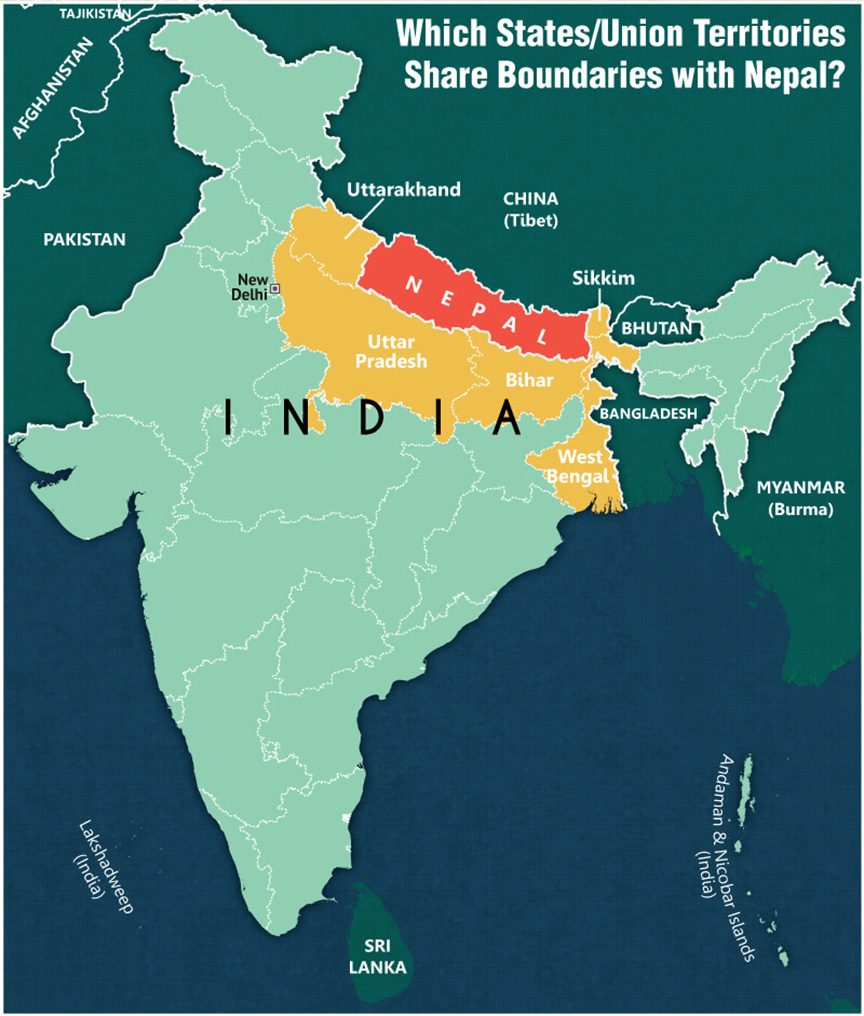International Relations
India-Nepal Rail Services Agreement (RSA)
- 10 Jul 2021
- 7 min read
Why in News
India and Nepal have signed a Letter of Exchange (LoE) to the India-Nepal Rail Services Agreement (RSA) 2004.
- It will allow all authorized cargo train operators to utilize the Indian railway network to carry Nepal's container and other freight - both bilateral between Indian and Nepal or third country from Indian ports to Nepal.
- The authorized cargo train operators include public and private container trains Operators, automobile freight train operators, special freight train operators or any other operator authorized by Indian Railways.
Key Points
- About Rail Services Agreement (RSA), 2004:
- The Rail Services Agreement was executed in 2004 between the Ministry of Railways, Government of India and the Ministry of Commerce, the Govt. of Nepal for introduction of freight train services between these two countries to and from Birgunj (Nepal) via Raxaul (India).
- The agreement guides movement between India and Nepal by rail.
- The Agreement shall be reviewed every five years and may be modified (through Letters of Exchange) by the Contracting Parties by mutual consent.
- In the past, there have been amendments to RSA through LoE on three occasions.
- First such amendment was in 2004.
- Second LoE was signed in 2008 at the time of introduction of bilateral cargo between the two countries which required introduction of new customs procedures.
- Third LoE was signed in 2016 enabling rail transit traffic to/from Visakhapatnam Port in addition to existing provision of rail transportation through Kolkata/Haldia Port.
- Benefits of the Latest Agreement:
- Allow Market Forces to Operate: This liberalization will allow market forces (such as consumers and buyers) to come up in the rail freight segment in Nepal, and is likely to increase efficiency and cost- competitiveness, eventually benefiting the Nepalese consumer.
- Reduce Transportation Cost: The liberalisation will particularly reduce transportation costs for automobiles and certain other products whose carriage takes place in special wagons and will boost rail cargo movement between the two countries.
- Enhance Regional Connectivity: Wagons owned by Nepal Railway Company will also be authorized to carry Nepal-bound freight (inbound and outbound on Kolkata/Haldia to Biratnagar/Birganj routes) over the Indian Railways network as per IR standards and procedures.
- The signing of this LoE marks another milestone in India’s efforts to enhance regional connectivity under the “Neighbourhood First” policy.
- Other Connectivity Project:
- Nepal being a landlocked country, it is surrounded by India from three sides and one side is open towards Tibet which has very limited vehicular access.
- India-Nepal has undertaken various connectivity programs to enhance people-to-people linkages and promote economic growth and development.
- MoUs have been signed between both the governments for laying an electric rail track linking Kathmandu with Raxaul in India.
- India is looking to develop the inland waterways for the movement of cargo, within the framework of trade and transit arrangements, providing additional access to sea for Nepal calling it linking Sagarmatha (Mt. Everest) with Sagar (Indian Ocean).
- In 2019, India and Nepal have jointly inaugurated a cross-border petroleum products pipeline.
- Pipeline carries petroleum products from Motihari in India to Amlekhgunj in Nepal.
- This is South Asia’s first cross-border petroleum products pipeline.
Neighbourhood First Policy
- It is part of India’s foreign policy that actively focuses on improving ties with India's immediate neighbours which is being termed as Neighbourhood first policy in the media.
- It was started well by inviting all heads of state/heads of government of South Asian countries in the inauguration of PM Narendra Modi first term and later held bilateral talks with all of them individually which was dubbed as a mini SAARC summit.
- In the second swearing-in ceremony in 2019, India had invited the heads of BIMSTEC countries.
Indo-Nepal Relations
- Neighbour: Nepal is an important neighbour of India and occupies special significance in its foreign policy because of the geographic, historical, cultural and economic linkages/ties that span centuries.
- The India-Nepal Treaty of Peace and Friendship of 1950 forms the bedrock of the special relations that exist between India and Nepal.
- Cultural Ties: India and Nepal share similar ties in terms of Hinduism and Buddhism with Buddha’s birthplace Lumbini located in present day Nepal.
- Open Border: The two countries not only share an open border and unhindered movement of people, but they also have close bonds through marriages and familial ties, popularly known as Roti-Beti ka Rishta.
- Common Multilateral Forums: India and Nepal share multiple multilateral forums such as BBIN (Bangladesh, Bhutan, India, and Nepal), BIMSTEC (Bay of Bengal Initiative for Multi Sectoral Technical and Economic Cooperation), Non Aligned Movement, and SAARC (South Asian Association for Regional Cooperation) etc.
- Issues:
- In 2017, Nepal signed up to China's Belt and Road Initiative (BRI), which sought to create highways, airports and other infrastructure in the country.
- BRI was rejected by India and this move of Nepal was seen as an inclination towards China.
- Currently, India and Nepal have border disputes over Kalapani - Limpiyadhura - Lipulekh trijunction between India-Nepal and China and Susta area (West Champaran district, Bihar).
- In 2017, Nepal signed up to China's Belt and Road Initiative (BRI), which sought to create highways, airports and other infrastructure in the country.







